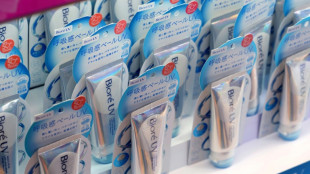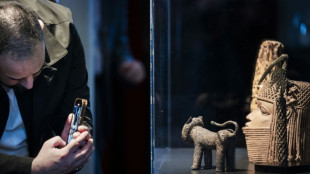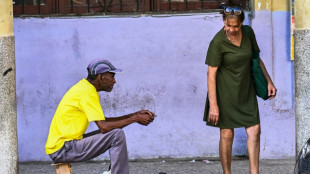
-
 Japan's high-tech sunscreens tap into skincare craze
Japan's high-tech sunscreens tap into skincare craze
-
Tesla expected to launch long-discussed robotaxi service

-
 South Korea counts on shipbuilding to ease US tariff woes
South Korea counts on shipbuilding to ease US tariff woes
-
Bombing Iran, Trump gambles on force over diplomacy

-
 Trump says US attack 'obliterated' Iran nuclear sites
Trump says US attack 'obliterated' Iran nuclear sites
-
Itoje to Valetini: five to watch when the Lions face Australia

-
 Wallabies confident but wary of wounded British and irish Lions
Wallabies confident but wary of wounded British and irish Lions
-
Utopia and fragile democracy at Art Basel fair

-
 Freed Israeli hostage recounts 484-day nightmare in Gaza
Freed Israeli hostage recounts 484-day nightmare in Gaza
-
River Plate frustrated by Monterrey in 0-0 stalemate

-
 Panama cuts internet, cell phones in restive province
Panama cuts internet, cell phones in restive province
-
Tens of thousands join pro-Palestinian marches across Europe

-
 Coach Penney unsure of return to Super Rugby champions Crusaders
Coach Penney unsure of return to Super Rugby champions Crusaders
-
Trump says US 'obliterated' Iran nuclear sites, threatens more

-
 Olympic chief Kirsty Coventry's steeliness honed by hard knocks
Olympic chief Kirsty Coventry's steeliness honed by hard knocks
-
Outgoing IOC president Thomas Bach faced mammoth challenges

-
 Maro Itoje comes of age with Lions captaincy
Maro Itoje comes of age with Lions captaincy
-
Trump says US bombs Iran nuclear sites, joining Israeli campaign

-
 In New York, Vermeer show reveals art of the love letter
In New York, Vermeer show reveals art of the love letter
-
Ex-members of secret US abortion group fear return to dark era

-
 Trump says US launched 'very successful' attack on Iran nuclear sites
Trump says US launched 'very successful' attack on Iran nuclear sites
-
Man City squad must be trimmed: Guardiola

-
 Minjee Lee grabs four-shot lead at 'brutal' Women's PGA Championship
Minjee Lee grabs four-shot lead at 'brutal' Women's PGA Championship
-
Olympic balloon rises again in Paris

-
 Inter Milan, Dortmund claim first wins at Club World Cup
Inter Milan, Dortmund claim first wins at Club World Cup
-
South American teams lay down the gauntlet to Europe at Club World Cup

-
 Fleetwood grabs PGA Travelers lead as top-ranked stars fade
Fleetwood grabs PGA Travelers lead as top-ranked stars fade
-
'Lucky' Lamothe hat-trick guides Bordeaux-Begles into Top 14 final

-
 Lamothe hat-trick guides Bordeaux-Begles into Top 14 final
Lamothe hat-trick guides Bordeaux-Begles into Top 14 final
-
UK PM Starmer says Kneecap should not perform Glastonbury

-
 Inter Milan strike late to beat Urawa Reds at Club World Cup
Inter Milan strike late to beat Urawa Reds at Club World Cup
-
Dortmund stars hide from sun at Club World Cup 'sauna'

-
 One game to win it all: Thunder host Pacers in NBA Finals game 7
One game to win it all: Thunder host Pacers in NBA Finals game 7
-
Russell says he's buried Sexton hatchet as old rivals united in quest for Lions glory

-
 Nigeria receives over 100 looted artifacts from the Netherlands
Nigeria receives over 100 looted artifacts from the Netherlands
-
I. Coast president Ouattara tapped to run for fourth term

-
 Protesters slam war profiteering, Israel at French air fair
Protesters slam war profiteering, Israel at French air fair
-
Belarus frees jailed opposition leader after appeal from US

-
 Medvedev dispatches home hope Zverev to meet Bublik in Halle final
Medvedev dispatches home hope Zverev to meet Bublik in Halle final
-
Nigeria receives over 100 looted artifacts from Netherlands

-
 Hundred hero Pope answers England's prayers as Bumrah strikes in first Test
Hundred hero Pope answers England's prayers as Bumrah strikes in first Test
-
Bellingham strikes as Dortmund sink Sundowns in Club World Cup thriller

-
 Feyi-Waboso sees red as France beat England in unofficial Test
Feyi-Waboso sees red as France beat England in unofficial Test
-
From attendances to NBA-style walkouts: Club World Cup talking points

-
 Eight dead in Brazil hot air balloon accident
Eight dead in Brazil hot air balloon accident
-
Bellingham strikes as Dortmund sink Sundowns

-
 Alcaraz sets up Queen's final clash with Lehecka
Alcaraz sets up Queen's final clash with Lehecka
-
MLB suspends Padres pitcher three games for hitting Ohtani

-
 Belarus opposition leader freed from jail after US mediation
Belarus opposition leader freed from jail after US mediation
-
Medvedev dispatches home hope Zverev to reach Halle final


Afghan women risk Taliban wrath over hair trade
Until Taliban authorities took power in Afghanistan, women like Fatima were able to freely sell their hair to be made into wigs, bringing in crucial cash.
But a ban last year has forced the 28-year-old and others to covertly trade hair -- collected from shower drains or the salon floor -- braving the risk of punishment one strand at a time.
"I need this money," said Fatima, 28, one of the few women still in paid private employment in Kabul after the Taliban regained control in 2021.
"I can treat myself to something or buy things for the house."
The woman, who withholds her last name for security reasons, sells every 100 grams of hair for little more than $3, a small addition to her monthly salary of $100.
Buyers who want to export the locks for wig production abroad "would knock on our doors to collect" the hair, she said.
One of those buyers is a man, who also requested anonymity, sending the manes to Pakistan and China from Afghanistan, one of the world's poorest countries.
Taliban authorities have cracked down on the rights of women, imposing what the UN calls a "gender apartheid".
They banned women and girls from universities and schools, effectively strangling their employment hopes.
Women have also been barred from parks and gyms, while beauty salons have been shut down.
- 'Not allowed' -
Last year, Taliban authorities imposed vice and virtue laws regulating everyday life for men and women, including banning sales of "any part of the human body" including hair.
They have not said what the punishment for violations would be.
"We must respect the appearance that God has given to humans and preserve their dignity," Ministry for Promotion of Virtue and Prevention of Vice (PVPV) spokesman Saiful Islam Khyber told AFP.
He said the trading of hair had become "normalised" in the country and that now "selling body parts is not allowed."
Hair sales are so sensitive that the ministry which handles morality issues burned nearly a ton of human strands in Kabul province in January.
The PVPV said in a statement it burned the batch "to protect Islamic values and human dignity".
The restrictions have not deterred Fatima, however.
During prayer times, when Taliban officials and forces attend the mosque, Fatima sneaks to a Kabul waste site to hand over her cache of tresses.
The few extra dollars are significant, with 85 percent of Afghans living on less than a dollar a day, according to the United Nations Development Programme (UNDP).
- Secret salon -
At a secret salon in Kabul, two worn-out leather chairs sit in a small, cold room where hairdresser Narges now only receives about four customers a week.
Before the 2021 takeover, the 43-year-old widowed hairdresser used to give crop cuts to five to six clients every day.
Now, only the wealthiest of her customers brave visiting the salon, and even they sometimes ask if they can take valuable spare hair home with them.
"They're the only ones who can still care about beauty," she said.
For others, the threat of a Taliban punishment is too much to risk.
Wahida, a 33-year-old widow whose husband was a soldier killed in 2021, has a constant worry about how she will feed her three children.
She still collects hair that has fallen from her eight-year-old daughter's head and her own, with strands from the root more valuable than those cut with scissors.
The unemployed Afghan woman, who now relies almost entirely on charity, stuffs them in a plastic bag to keep them for a potential sale later.
"I had a glimmer of hope when I used to sell my hair. Now that it's banned, I'm devastated. I'm hoping buyers will come back to my door," she said, sitting in her home.
"I know there are places to sell. But I am afraid of getting caught there."
T.Samara--SF-PST


